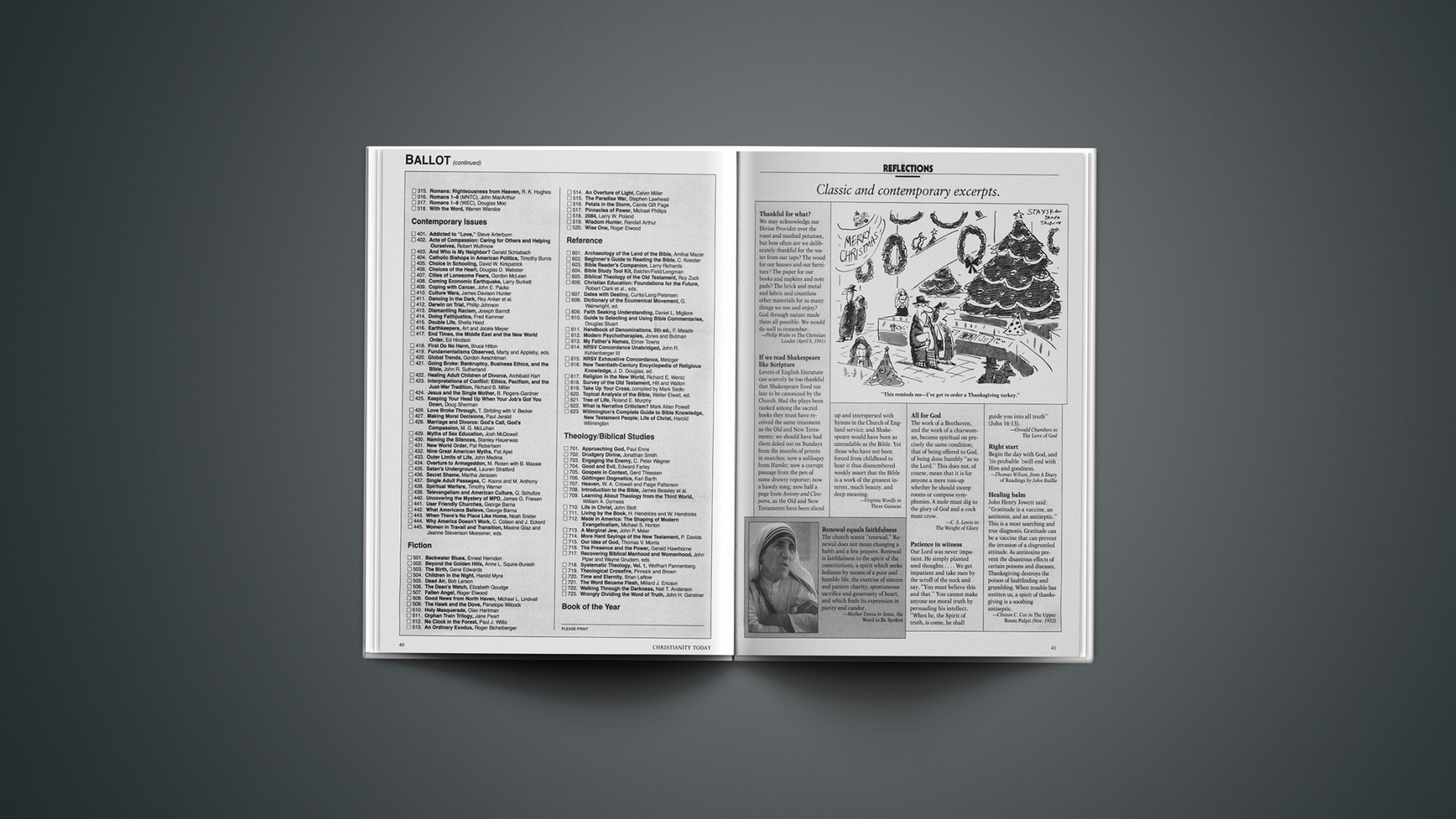Thankful For What?
We may acknowledge our Divine Provider over the roast and mashed potatoes, but how often are we deliberately thankful for the water from our taps? The wood for our houses and our furniture? The paper for our books and napkins and note pads? The brick and metal and fabric and countless other materials for so many things we use and enjoy? God through nature made them all possible. We would do well to remember.
—Philip Wiebe in The Christian Leader (April 9, 1991)
If we read Shakespeare like Scripture
Lovers of English literature can scarcely be too thankful that Shakespeare lived too late to be canonized by the Church. Had the plays been ranked among the sacred books they must have received the same treatment as the Old and New Testaments; we should have had them doled out on Sundays from the mouths of priests in snatches; now a soliloquy from Hamlet; now a corrupt passage from the pen of some drowsy reporter; now a bawdy song; now half a page from Antony and Cleopatra, as the Old and New Testaments have been sliced up and interspersed with hymns in the Church of England service; and Shakespeare would have been as unreadable as the Bible. Yet those who have not been forced from childhood to hear it thus dismembered weekly assert that the Bible is a work of the greatest interest, much beauty, and deep meaning.
—Virginia Woolfe in Three Guineas
Renewal equals faithfulness
The church wants “renewal.” Renewal does not mean changing a habit and a few prayers. Renewal is faithfulness to the spirit of the constitutions, a spirit which seeks holiness by means of a poor and humble life, the exercise of sincere and patient charity, spontaneous sacrifice and generosity of heart, and which finds its expression in purity and candor.
—Mother Teresa in Jesus, the Word to Be Spoken
All for God
The work of a Beethoven, and the work of a charwoman, become spiritual on precisely the same condition, that of being offered to God, of being done humbly “as to the Lord.” This does not, of course, mean that it is for anyone a mere toss-up whether he should sweep rooms or compose symphonies. A mole must dig to the glory of God and a cock must crow.
—C. S. Lewis in The Weight of Glory
Patience in witness
Our Lord was never impatient. He simply planted seed thoughts.… We get impatient and take men by the scruff of the neck and say, “You must believe this and that.” You cannot make anyone see moral truth by persuading his intellect. “When he, the Spirit of truth, is come, he shall guide you into all truth” (John 16:13).
—Oswald Chambers in The Love of God
Right start
Begin the day with God, and ’tis probable ’twill end with Him and goodness.
—Thomas Wilson, from A Diary of Readings by John Baillie
Healing balm
John Henry Jowett said: “Gratitude is a vaccine, an antitoxin, and an antiseptic.” This is a most searching and true diagnosis. Gratitude can be a vaccine that can prevent the invasion of a disgruntled attitude. As antitoxins prevent the disastrous effects of certain poisons and diseases, Thanksgiving destroys the poison of faultfinding and grumbling. When trouble has smitten us, a spirit of thanksgiving is a soothing antiseptic.
—Clinton C. Cox in The Upper Room Pulpit (Nov. 1952)










